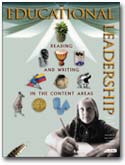Welcome to EL Extra. We have designed questions to help you and your colleagues foster meaningful discussion about the articles in the November 2002 issue of Educational Leadership.
These questions will not cover all the topics contained in this issue, but we hope that they will help you generate conversations about key ideas. Feel free to adapt the questions to be more relevant to your school or school district. Although you can consider many of the questions on your own, we encourage you to use them in pairs, small groups, or even large study groups.
“Every Teacher a Teacher of Reading”
Richard Vacca (“From Efficient Decoders to Strategic Readers”) expresses the hope that the perennial vision “Every teacher, a teacher of reading” will soon become a reality. Do you believe that this vision is achievable? Is it desirable?
- Provide time and a structure for teacher study groups to reflect on their current practices and discuss new strategies (Marcia D’Arcangelo, “The Challenge of Content-Area Reading: A Conversation with Diane Ogle”).
- Identify specific literacy strategies to be applied schoolwide, and provide ongoing professional development targeted to building teachers’ expertise in using these strategies (Douglas Fisher, Nancy Frey, and Douglas Williams, “Seven Literacy Strategies that Work”).
- Allocate funds to provide diverse, high-quality instructional resources to replace textbook-only instruction. Help teachers build a rich collection of supplemental reading materials, either at a central school location or in individual classrooms (Gay Ivey, “Getting Started: Manageable Literacy Practices”).
Nurturing Adolescents’ Interest in Reading
Schools do not do enough to encourage adolescents’ recreational reading, writes Thomas W. Bean (“Making Reading Relevant for Adolescents”). Adolescents have wide-ranging interests and are deeply concerned with exploring their own identities and life options, and schools could take advantage of a great deal of young adult literature dealing with these themes.
Discuss with a group of colleagues whether you agree that schools should encourage students’ recreational reading and attempt to tie it to the curriculum. Consider Bean’s example of teaching Shakespeare’s Romeo and Juliet together with the contemporary novel Finding My Voice by Marie Lee. Would such an approach dilute or enrich students’ perceptions of the value of classic literature by equating it with more accessible contemporary materials? Brainstorm with other teachers your ideas about powerful young adult books that would be valuable supplements to the content areas.
Problems with Textbooks
Several authors in this issue discuss difficulties related to textbooks. Richard L. Allington (“You Can’t Learn Much from Books You Can’t Read”) cites research showing that many classrooms use textbooks written above the reading level of their students. Isabel L. Beck and Margaret G. McKeown (“Questioning the Author: Making Sense of Social Studies”) assert that social studies textbooks often lack explanations and connections among ideas and events. Mary Lee Barton, Clare Heidema, and Deborah Jordan (“Teaching Reading in Mathematics and Science”), point out that many textbook authors are content experts who know their subject matter so well they skip steps or fail to provide relevant background information.
From your own experience, have you found that these criticisms of textbooks are justified? Discuss with your colleagues the quality of the textbooks available to you in your school. How much do you use textbooks to guide the curriculum, and how much do you rely on other resources and materials? When you use textbooks, do you provide supports to help students understand the text? In a discussion group, share your successful strategies.

